As you get less sleep, it’s tempting to reach for an energy or caffeinated drink to stay awake during the day. Believe it or not, consuming these types of drinks to combat sleepiness, can lead to a vicious cycle.
Yes, caffeine will help you stay awake, but it can easily take up to eight hours to wear off. This means it can also reduce your sleep time and decrease the quality of your sleep.
So, how do can you stay awake naturally?
In one well-known study, Robert Thayer, PhD, a professor at California State University, Long Beach, studied whether people were more energized by eating a candy bar or taking a brisk 10-minute walk.
Though the candy bar provided a quick energy boost, participants were actually more tired and had less energy an hour later. The 10-minute walk increased energy for two hours. That’s because walking pumps oxygen through your veins, brain, and muscles.
If you work at a desk, get up frequently for short walks. At meal breaks, walk to a restaurant or, if you bring your lunch, head for a nice spot to eat it. Whether you take a walk outside or just in the building where you work, it will make you feel more alert and refreshed.
There are two things to remember about naps: Don’t take more than one and don’t take it too close to your bedtime.
“Nap between five and 25 minutes,” says Barry Krakow, MD, author of Sound Sleep, Sound Mind: Seven Keys to Sleeping Through the Night. It’s best to nap about six or seven hours before you would normally go to bed. If you must take a late nap close to bedtime, make it a short one.
Napping on the job can be touchy. If you need to nap at work, do it during your break and use a vibrating alarm clock, if necessary, to make sure it doesn’t spill over into your work time.
Sleeping at your desk is usually not a good idea, but many companies now provide nap rooms for employees.
“If you can’t nap, even resting quietly with your eyes closed for 10 minutes or so will help,” says Allison T. Siebern, PhD, a fellow at the Stanford University Sleep Medicine Center in Redwood City, Calif.
Continuous fixation on a computer screen can cause eyestrain and worsen sleepiness and fatigue.
Look away from the screen for a few minutes periodically to relax your eyes.
Sugary snacks give you a quick energy boost followed by the sugar “lows,” when low blood sugar produces mental fogginess and lethargy.
Snacks such as these will provide better overall energy in the long run:
If you’re fading fast, engaging in conversation can get your mind moving again.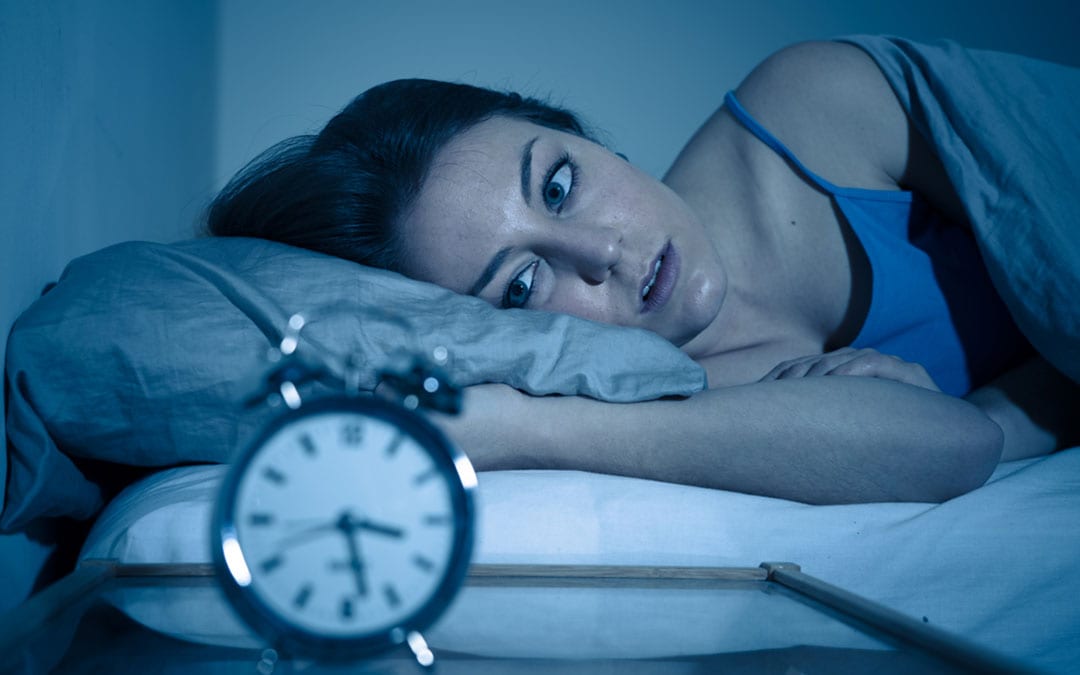 “Talk to a colleague about a business idea, politics, or religion,” says Krakow, medical director of Maimonides Sleep Arts and Sciences, Ltd. in Albuquerque, N.M. “It’s a very strong behavioral stimulator — especially when it’s a conversation about politics.”
“Talk to a colleague about a business idea, politics, or religion,” says Krakow, medical director of Maimonides Sleep Arts and Sciences, Ltd. in Albuquerque, N.M. “It’s a very strong behavioral stimulator — especially when it’s a conversation about politics.”
Environments with dim lighting aggravate fatigue. Studies have shown that exposure to bright light can reduce sleepiness and increase alertness. Try increasing the intensity of your light source at work.
Deep breathing raises blood oxygen levels in the body. This slows your heart rate, lowers blood pressure, and improves circulation, ultimately aiding mental performance and energy.
The idea of deep-breathing exercises is to inhale to the abdomen, not the chest. You can do them at your desk. Sitting up straight, try this exercise up to 10 times:
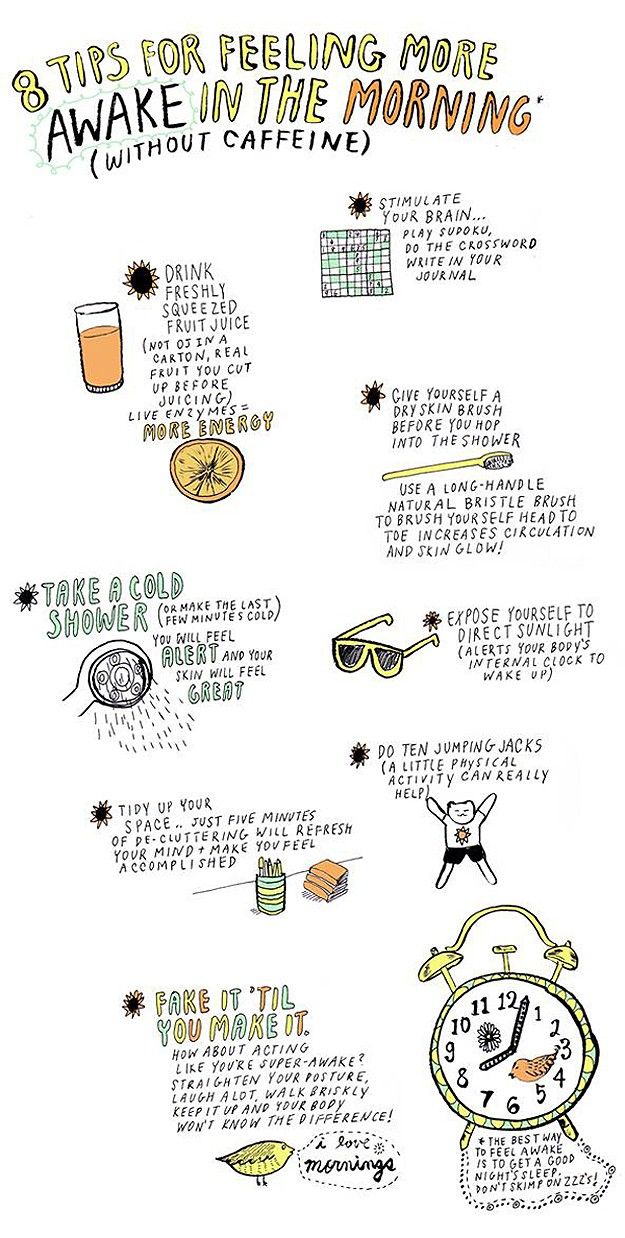 Your chest should not move.
Your chest should not move. Another technique, called stimulating breath, is used in yoga for a quick energy boost and increased alertness:
“Driving while sleepy is as dangerous as driving under the influence of alcohol,” says Siebern. Common tricks such as opening the windows and turning on loud music won’t keep you awake for very long behind the wheel. “Have someone else drive or pull off the road and take a nap until you’re no longer sleepy,” Siebern says.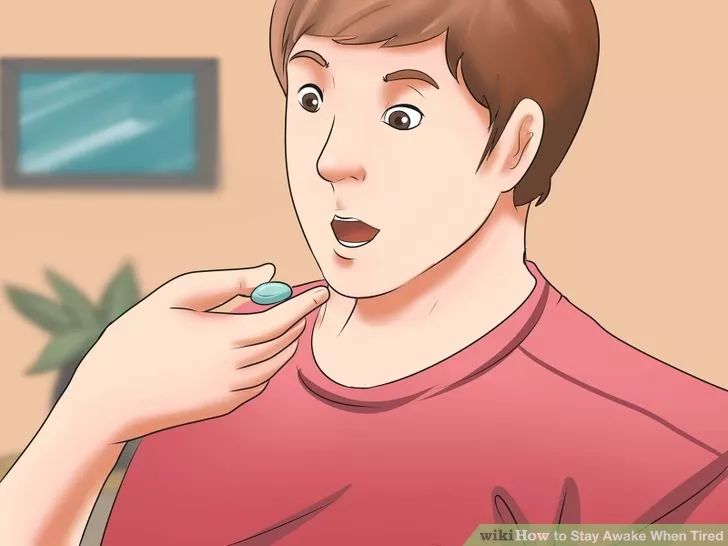
If you’re on an extended trip, change drivers often. Stop at least every two hours to take a walk and get some fresh air.
In 2004 Finnish researchers who studied people working 12-hour night shifts found that monotonous work is as harmful as sleep loss for alertness.
At work or home, try to reserve more stimulating tasks for your sleepy times. Or switch to more engaging work responsibilities when you feel yourself nodding off.
Dehydration can cause fatigue. Make sure you drink plenty of fluids and eat foods high in water such as fruits and vegetables.
Our circadian rhythms, which regulate our sleep-wake cycle, are influenced by daylight. Try to spend at least 30 minutes a day outside in natural sunlight. (Sleep experts recommend an hour of morning sunlight a day if you have insomnia.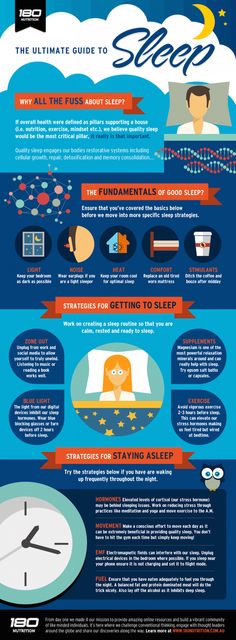 ) Even a step outside for a breath of fresh air will revive your senses.
) Even a step outside for a breath of fresh air will revive your senses.
In a 2006 analysis of 70 studies involving more than 6,800 people, University of Georgia researchers found that exercise was more effective in increasing energy and reducing daytime fatigue than some medications used to treat sleep problems.
Regular exercise also improves quality of sleep. Try to exercise 30 minutes a day.
If you decide to exercise hard some days, your energy level may drop for a bit and then surge for a few hours.
Eating a meal that contains both protein and carbohydrates within two hours after a heavy workout will lessen the initial energy loss. Be sure to finish your workout a few hours before bedtime so you are not energized when you try to sleep.
The team at Salem Health is here for you. Call our Sleep Center providers today!
Sometimes the dreaded all-nighter just can’t be avoided. Maybe you have a new job working night shifts, it’s finals week, or you’re having a sleepover party. Regardless of your reasons, staying up all night is tough.
Maybe you have a new job working night shifts, it’s finals week, or you’re having a sleepover party. Regardless of your reasons, staying up all night is tough.
Human sleep patterns follow natural circadian rhythms. Your circadian rhythms are like internal clocks affecting the way you think, feel, and behave throughout the day. Circadian rhythms are based on the lightness or darkness of your environment.
When your brain perceives darkness outside, your body begins to release a hormone called melatonin. Melatonin makes you drowsy and prepares your body for sleep.
Staying up all night means fighting this natural process, which is not only difficult, but also unhealthy. Sleep deprivation can impact your ability to learn and focus. It can even be dangerous. In 2013, there were at least 72,000 car accidents caused by drowsy driving.
If you must stay up all night, the following tips can help you do it safely.
The easiest way to stay up all night is to reset your internal clock. This can take up to one week, but it’s possible. You may experience serious drowsiness at first, but your body does catch on.
This can take up to one week, but it’s possible. You may experience serious drowsiness at first, but your body does catch on.
If you’re switching to the night shift, give your body a few days of practice. Your circadian rhythms still rely on light cues, so make sure you’re sleeping in a very dark room during the day. Blackout curtains and eye masks are particularly helpful.
Caffeine is a helpful pick-me-up and can increase your alertness. It helps fight one of the natural substances your body releases to make you drowsy.
Studies have found that moderate doses of caffeine (600 milligrams [mg] or more than four cups of coffee) can improve your ability to think and perform tasks, but high doses (900 mg or more) have the opposite effect. High doses of caffeine can cause symptoms like anxiety and shakiness that make it harder for you to concentrate.
To stay up all night, don’t rely on one big dose of caffeine. Too much coffee can lead to stomach upset. Instead, try taking several smaller doses throughout the night such as espresso shots, caffeine pills, or caffeinated gum.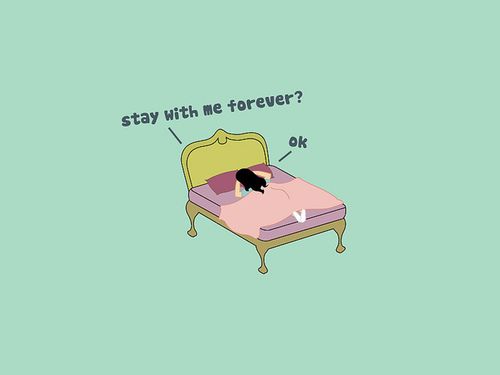
Energy drinks contain varying amounts of caffeine, typically the equivalent of one to five cups of coffee. They also contain guarana, an ingredient that also contains caffeine, which makes the total amount of caffeine higher than it appears.
When using energy drinks, it’s difficult to know exactly how much caffeine you’re ingesting, and extremely high doses of caffeine can be toxic. They’re especially dangerous when mixed with drugs or alcohol. In 2011, more than 20,000 people went to the emergency room because of energy drinks.
Taking a series of small naps throughout the night may help you stay alert. Although it’s not equal to a full night’s sleep, short naps can be restorative. Most studies on night-shift workers find that naps reduce sleepiness and improve performance.
Try to catch 15 to 20 minutes of sleep during a break. If you’re driving through the night, pull into a rest stop for a quick nap.
Daily exercise helps you maintain a healthy sleep schedule, but experts recommend avoiding exercise late at night, if you want to sleep well at night.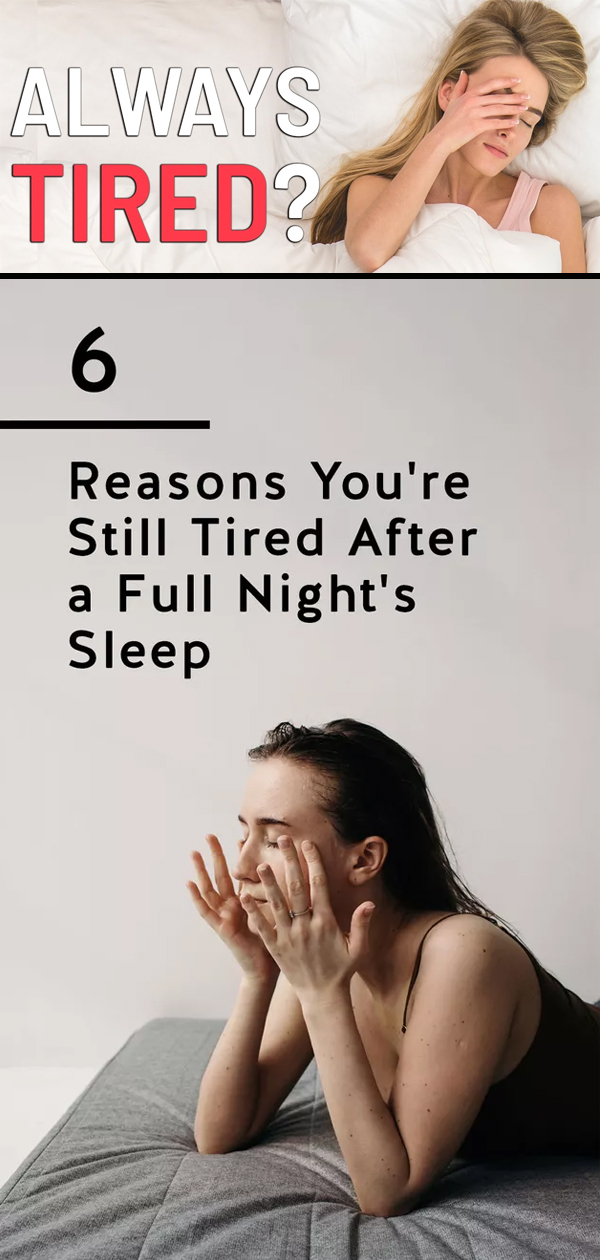 That’s because your body produces a lot of energy when you exercise, which can keep you awake.
That’s because your body produces a lot of energy when you exercise, which can keep you awake.
If you’re trying to stay up all night, try 30 to 40 minutes of aerobic exercise. If you don’t want to exercise, try getting up and moving around. Pace back and forth for 10 minutes, take a walk outside, or do a few jumping jacks.
Darkness cues your body to release melatonin, a hormone that makes you feel sleepy. One study found that using bright lights at night and creating darkness during the day can help night-shift workers reset their circadian rhythms.
Find a lamp that can distribute light widely throughout the room. Look for an LED bulb that can simulate sunlight. This should help you stay awake longer.
Your electronic devices, including laptops, tablets, TVs, and phones, emit something called “blue light.” The blue light emitted from your devices can delay the release of melatonin, the sleep hormone. This can prevent you from becoming sleepy.
To keep yourself awake, use a device that you can interact with.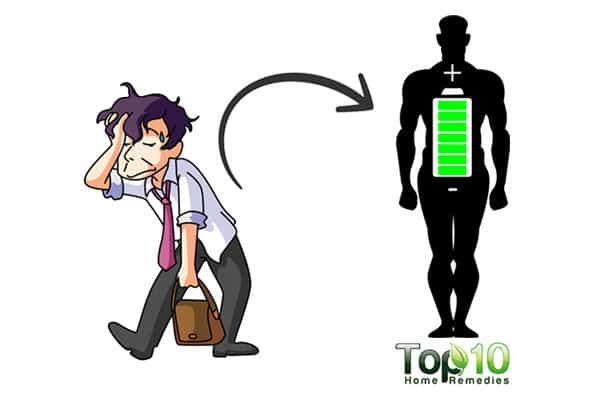 Try playing video games on your computer or tablet. The closer the blue light is to your face, the more awake you will feel.
Try playing video games on your computer or tablet. The closer the blue light is to your face, the more awake you will feel.
Taking a cold or lukewarm shower can help wake you up when you start to get tired. If you don’t want to shower, splashing your face with cold water can help. Brushing your teeth can make you feel refreshed.
Staying up all night isn’t good for you and should only be done as a last resort. After staying up all night, you’ll feel very drowsy. Try to make up the sleep the next day.
For more sleep support, check out our sleep shop.
October 1, 2020Tips
Discomfort, coffee with chocolate and trolling will help you stay awake until the morning.
Share
0 You can listen to this article. If it's more convenient for you, turn on the podcast.
Getting ready for bed usually involves a sequence of activities: putting on pajamas, drinking milk, reading a book. For ordinary days, this is an advantage: the body immediately understands that now you are going to bed. If you need to stay awake, these habits are best avoided.
For ordinary days, this is an advantage: the body immediately understands that now you are going to bed. If you need to stay awake, these habits are best avoided.
Being slightly hungry will keep you awake, as you are supposed to be active in order to get your own food.
Do not change into pajamas, even if they are very comfortable. Wear something you can't sleep in, like brand new, unworn jeans. Another helper will be shoes with laces. It will not give you the opportunity to "just lie down for five minutes." Unless, of course, you are used to falling asleep in your shoes every Friday.
If you really want to sleep, you will fall asleep even on a hard chair with nails sticking out in some places. A soft bed will not leave you a single chance to hold out until the morning. Therefore, choose not the most comfortable seats.
Studies have shown that bright light suppresses drowsiness.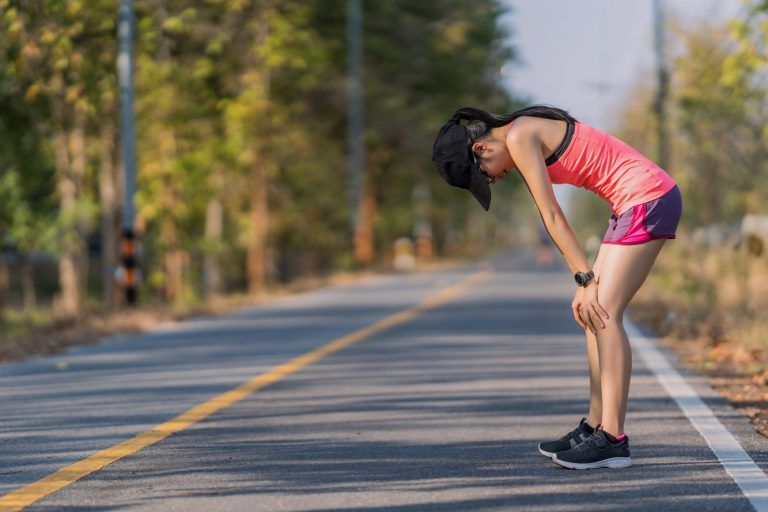 Turn on the overhead light, sconce, table lamp. It is impossible to overdo it in this matter. True, you should not pull this trick at parties: other visitors to a nightclub may be dissatisfied with the lights suddenly turned on.
Turn on the overhead light, sconce, table lamp. It is impossible to overdo it in this matter. True, you should not pull this trick at parties: other visitors to a nightclub may be dissatisfied with the lights suddenly turned on.
Find a person with a questionable position on Facebook* and try to convince him. You can sincerely argue or frankly troll, but the effect will be the same: from indignation, you will not only fall asleep - you will not be able to sit still.
Not the most unexpected, but working way. A sleepless night the day before leaves you virtually no chance to be productively awake. Unless, of course, you flew from the future to save John Connor. Therefore, before a strategically important night, sleep as hard as you can.
Caffeine does suppress sleepiness. True, there are nuances of drinking coffee, depending on how you want to spend the morning. If you drink it too actively, there is a risk that you will be too alert even when it's time to go to bed. If you drink just a little bit of coffee, you will easily fall asleep when the caffeine leaves your bloodstream.
If you drink it too actively, there is a risk that you will be too alert even when it's time to go to bed. If you drink just a little bit of coffee, you will easily fall asleep when the caffeine leaves your bloodstream.
Instead of trying to pinch yourself to stay awake, outsource this activity. Eat a portion of spicy, burning food. It will irritate the mucous membrane in your mouth enough to make you forget about sleep.
On a sleepless night, the very property of fast carbohydrates that adherents of a healthy diet scold them for is useful: they quickly break down into simple sugars and provide a strong, albeit short-term burst of energy. So ignore the advice of grandmothers "do not eat sweets at night, otherwise you will not fall asleep" and stock up on sweets.
Keep an eye on your level of fatigue, as the energy will leave your body just as quickly: as soon as you feel tired, it's time to take another bite from the chocolate bar.
Rinse face and wrists. Cold water is a kind of stress for the body, and therefore it will inevitably cheer up to eliminate discomfort.
Research has shown that chewing will keep you awake. The brain receives a signal that food is on its way to the stomach, and does not allow the body to relax in anticipation of a portion of energy. In general, you can chew anything, but chewing gum will be a longer-lasting option than food.
Dehydration can lead to fatigue, so listen carefully to your body's signals of thirst. The advice has an added bonus: Have you ever tried to sleep with a full bladder?
Physical activity is invigorating, and if you get up every hour and do 15 squats or push-ups, this will significantly extend the period of wakefulness. But jumping is better to avoid, although communication with the police squad, which the neighbors will call because of the noise, can invigorate better than any squats.
Surely there are puzzles that make you forget about everything in the world. For some, these are puzzles, for others - a new level of computer games. If you choose a movie or game, it is better that they are new to you and that you have to carefully follow the twists and turns of the plot.
A sleepless night is a great time to practice multitasking. Switch between different tasks to avoid switching to automatic work mode.
What methods do you use? Share in the comments.
Read also 🧐
*Activity of Meta Platforms Inc. and its social networks Facebook and Instagram are prohibited in the territory of the Russian Federation.
Is it possible to stay up all night without harm to your health and what, apart from a few cups of coffee, will help you stay awake? Share the answers to these questions and help prepare for a sleepless night
Contents
Sleep is necessary for health: even one sleepless night can negatively affect the body. If you do not sleep for more than 17 hours in a row [1], the reaction rate will decrease by 50% and the brain will not work at full capacity. In addition, due to increased sleepiness, the risk of an accident will increase.
If you do not sleep for more than 17 hours in a row [1], the reaction rate will decrease by 50% and the brain will not work at full capacity. In addition, due to increased sleepiness, the risk of an accident will increase.
In 1963, researcher William Dement and test subject Randy Gardner set up an experiment to find out how long a person could stay awake. Their record is 11 days and 25 minutes (by 2022 it is still unbeaten) [2]. During the experiment, Randy's mood fluctuated, he had hallucinations, he could not speak clearly, he forgot facts and got confused in his memories. This effect was from 11 days without sleep, but even one sleepless night can lead to health consequences.
Without sleep, the brain cannot “refresh”: fluid from the spine does not flow into it, which “washes away” toxins, some of which cause Alzheimer's disease [3]. And this is not the only harmful effect of sleep deprivation: a study in Sweden showed that just one sleepless night increased the risk of damage to brain cells by 20% [4].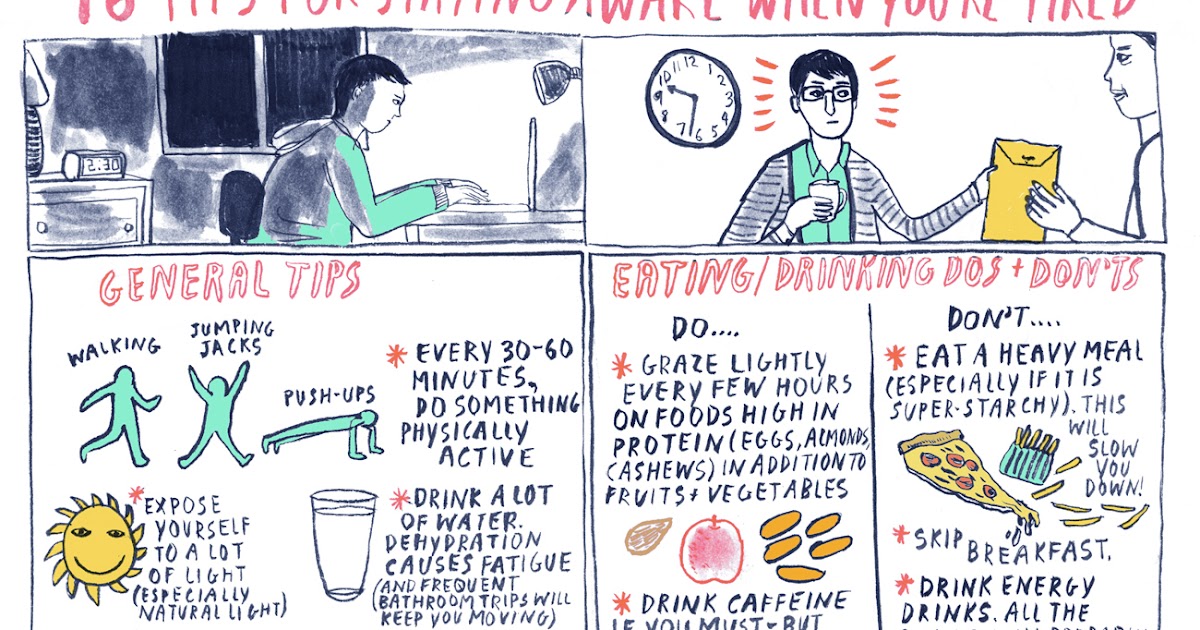
The reasons can be different: accumulated deadlines at work, shift schedule, upcoming exams or a night event. Recently, psychologists have noticed a new reason for refusing healthy sleep - procrastination. In English, it is called Revenge Bedtime Procrastination - "procrastination, taking revenge on sleep patterns" [5]. This is the name given to situations when a person refuses sleep in favor of leisure: doing a hobby, flipping through a feed on social networks or watching TV shows. However, for this, no additional prescriptions that do not allow you to fall asleep are required.
But sometimes work or school makes us neglect sleep. We tell you how to do business at night, minimizing the risk to health.
Our brain reacts to the change of day and night, and when it's dark, we automatically fall asleep. This is how the internal biological clock works [6]. To drive away drowsiness and increase vigilance, provide yourself with a bright source of light (and it is desirable that it be not yellow, but white).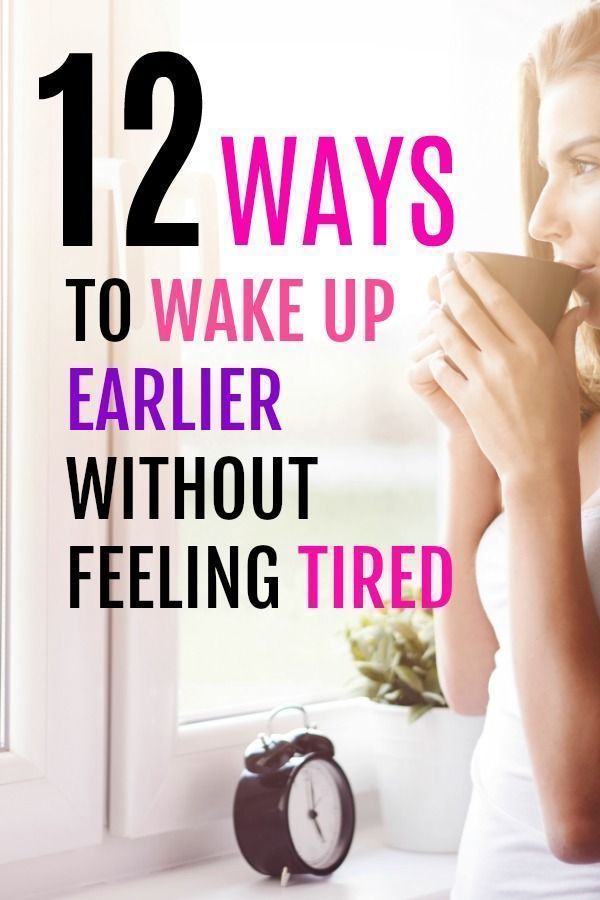 In dim lighting, you will only want to sleep more, and your concentration will drop.
In dim lighting, you will only want to sleep more, and your concentration will drop.
Normally, physical activity helps you fall asleep at night, but if you exercise 1-2 hours before bedtime, you will only cheer up [7]. Do a little exercise: jump, stretch or stretch. Do this every time you want to go to bed.
Staring at a computer screen for a long time can strain your eyes and cause dryness that will make you sleep more. Try sometimes to take your eyes off the monitor: for example, go for tea or coffee or do a warm-up for the eyes.
Dehydration reduces blood flow to the brain, resulting in a feeling of fatigue and increased sleepiness [8]. To avoid this, place a bottle of water near your workspace and drink when your mouth feels dry.
One of the most obvious ways, but it works. Studies have shown that if the human body has more than 600 milligrams of caffeine per day (that's about four mugs), it will be able to cope with tasks faster and more efficiently.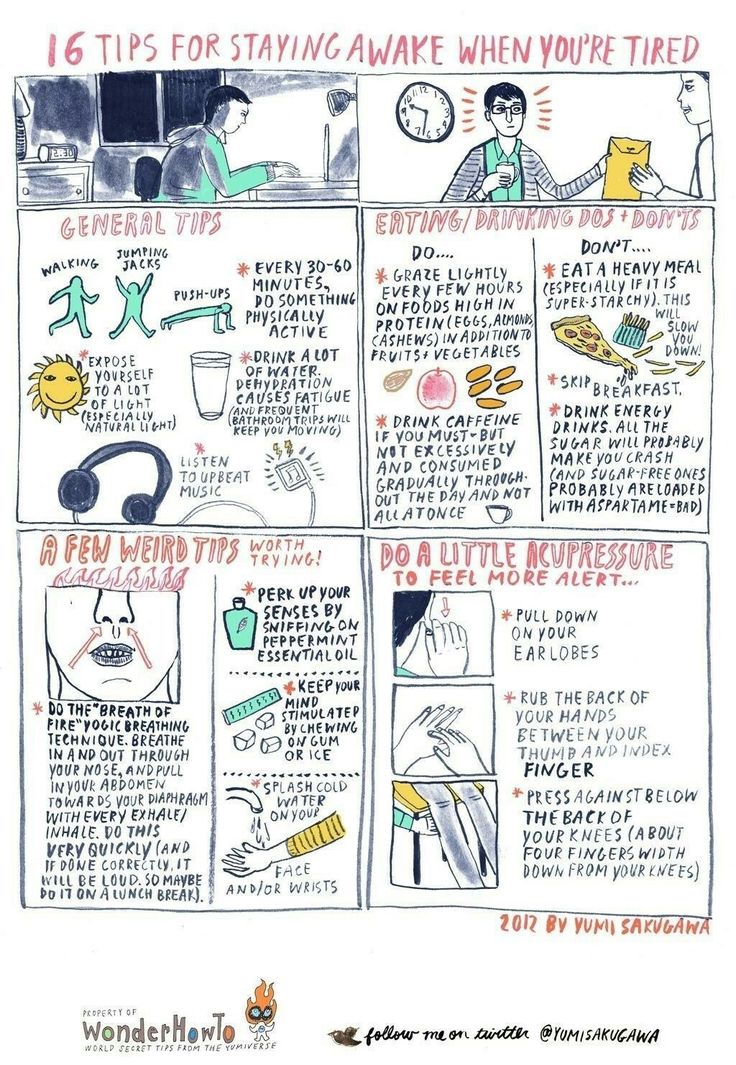 But be careful: large doses (from 900 mg) have the opposite effect. You will become more anxious and unable to concentrate [9].
But be careful: large doses (from 900 mg) have the opposite effect. You will become more anxious and unable to concentrate [9].
Energy drinks also contain caffeine, but their use can be dangerous. One drink is equal to about five mugs of coffee. In addition, energy drinks contain guarana, which also contains caffeine. It is quite difficult to calculate the exact dose, and you can overdo it: your head will start to hurt and feel dizzy, nervousness and anxiety will appear.
A cold or cool shower will help you feel refreshed and tired. If you don't have time for it, you can rinse your face and neck with cold water and brush your teeth to freshen up.
Short sleep will help you relieve accumulated fatigue and increase your own productivity [10]. Set yourself several alarms so you don't oversleep. If you sleep for more than 20 minutes, you will most likely snap yourself out of deep sleep and feel more overwhelmed than you were before.